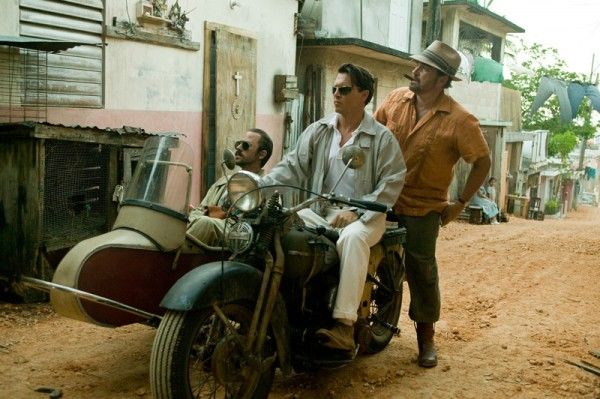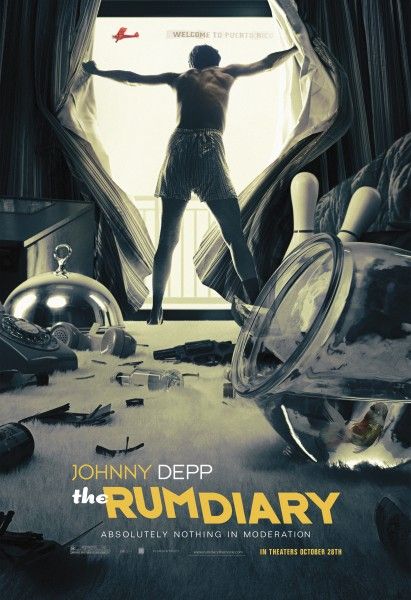Fear and Loathing in Las Vegas is widely considered to be the best adaptation of a Hunter S. Thompson book, but there can be no bigger love letter to the late author than The Rum Diary. Written and directed by Bruce Robinson, The Rum Diary draws in Thompson's language, ideology, and attitude. The film meanders through episodic misadventures and provides mere snapshots of supporting characters, but these weaknesses become strengths because they stay true to the subtext and tone of the story. The only misstep is the lack of chemistry in the relationship between the two lead characters, but for the most part, the movie always knows where to stumble.
Set in 1960, The Rum Diary follows despondent novelist and journalist Jack Kemp (Johnny Depp) who comes to Puerto Rico to take a job at a dying newspaper, but his true goal is to do as much drinking and avoid as much hard work as possible. Kemp strikes up a relationship with fellow journalist Bob Sala (Michael Rispoli) but various forces keep drawing Kemp in different directions. His editor Lotterman (Richard Jenkins) wants Kemp to help revitalize the paper, the greedy and amoral real estate developer Sanderson (Aaron Eckhart) wants Kemp to be a PR stooge so Sanderson can seize control of a local island, and Sanderson's girlfriend Chenault (Amber Heard) wants Kemp or she wants him wrapped around her finger.
The Rum Diary carries some heavy ideas: the nature of the predatory upper class, a critique of American ideals, and the power of the written word. But more than anything, The Rum Diary examines how passion can teach, it can embolden, it can guide, but it cannot and should not be controlled. Only through losing himself in Puerto Rico can Kemp find his voice. It's not simply a matter of building experiences, but looking at the perspectives of others so you can better understand your own. Lotterman's journalistic apathy and Sanderson's unbridled avarice help to illuminate Kemp's path even though he wasn't looking to be enlightened.
But the subtext never becomes heavy handed because Robinson lets the story unfold at its own pace and, more importantly, he lets it be fun. Hunter S. Thompson could cut through bullshit like few others, but he was also damn funny. The Rum Diary has an overarching narrative, but it lives in the bizarre and humorous misadventures of Kemp and Sala. Every night they seem to have another great story, but they're never out to find one. It just happens that you get chased down by a bunch of angry Puerto Ricans and your only defense is to use grain alcohol for the purpose of fire-breathing. Sometimes you bet your future on cockfighting. And some nights you get high on the drugs the government gives communists and through the hallucinations you scream "Your tongue is an accusatory giblet!" The episodic approach causes the story to meander and occasionally drag, but it's the only way to stay true to the overall theme.
The same holds true to character development. Lotterman, Sanderson, Sanderson's girlfriend and Kemp's lust-interest Chenault (Amber Heard), and Kemp's alcoholic-in-extremis colleague Moburg (Giovanni Ribisi) all have something to contribute to Kemp's development, but Robinson isn't interested in separately fleshing out the supporting characters. They're symbols that have enough personality to feel like real people. The important characters are Kemp and Sala ,and separately, Depp and Rispoli do a fine job. There's a little bit of Depp's Fear and Loathing performance in Kemp but not to the point where it feels like a re-tread; Kemp's tale is more like an origin story for where Thompson would be by the time of Fear and Loathing. Rispoli perfectly plays Sala's world-weariness and provides enough energy that we believe he would come along for the ride. But the chemistry between the two characters never really clicks, which is a problem because it's the key relationship in the film. Kemp and Sala's friendship is serviceable enough, and while you can tell there's a mutual respect between the characters, it rarely feels like there's much camaraderie.
Thankfully, there's enough energy in the relationship to carry it through the winding narrative. The Rum Diary knows where it wants to go, but it's in no rush to get there. The movie doesn't second-guess Thompson, but it never feels so slavishly faithful that it lacks a personality of its own. The best honor it provides to Thompson's memory is that it allows his words and beliefs to transcend the tribute.
Rating: B



